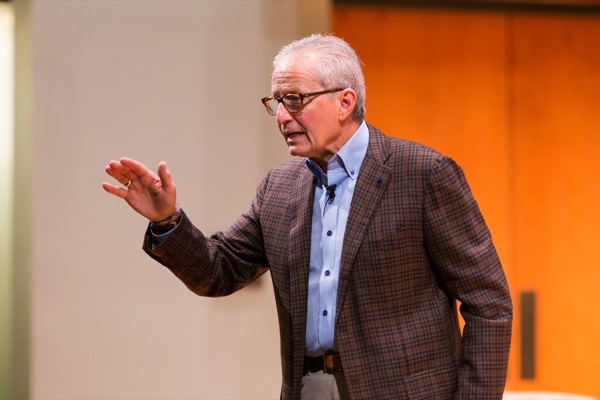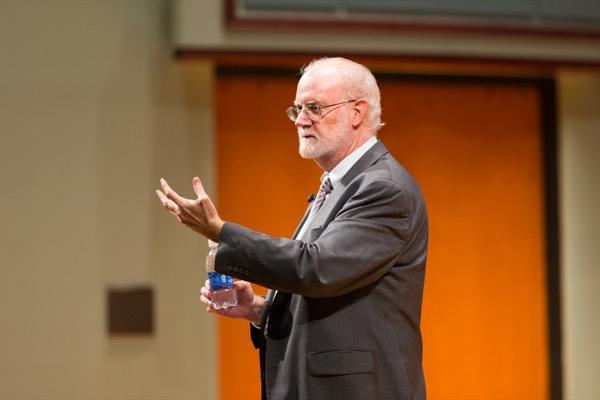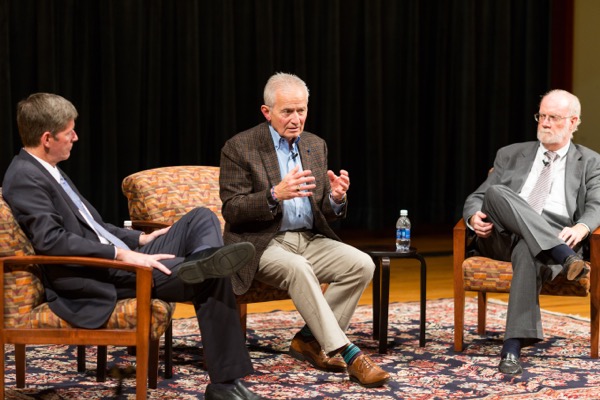


The future of work
Thought Leader Donofrio says 'T-shaped' people needed to promote innovation
3:14 p.m., Oct. 30, 2015--If you ask Nick Donofrio, what this country's economy needs is a lot more "T-shaped" people.
Unlike the more familiar "I-shaped" people – whose training, skills and experience are linked mostly to one field and discipline – "T-shaped" people are "deep and broad," he said. They have specific training plus a knack for connecting and collaborating with others, adding their personal skills to those of a diverse team to expand their reach and effectiveness.
Campus Stories
From graduates, faculty
Doctoral hooding
Donofrio, retired IBM executive vice president for innovation and technology, made his comments as part of the University of Delaware's "Thought Leader" series.
The series emerged from the University's strategic initiative plan and gives opportunity for the UD community to consider the role of higher education with speakers who "really challenge us to think deeply and to think differently about how we prepare and educate our students for 21st-century living and the 21st-century economy," said Charles Riordan, deputy provost for research and scholarship and professor of chemistry and biochemistry.
The series continues at 4 p.m., Tuesday, Nov. 3, at the Roselle Center for the Arts, when Andrew W. Mellon Foundation president and social historian Earl Lewis visits to discuss “Why Learn: In Search of Higher Education’s Future.”
Donofrio was joined by Ken Jarboe, senior program officer at the National Academy of Engineering (NAE).
Their focus was on the NAE's recent report "Making Value for America," which lays out stark truths about how work is changing, the implications of that change for the U.S., the need for innovation and collaboration and other recommendations for the future. The second phase of the study will focus on specifics of education and collaboration, Donofrio said.
The evidence of sweeping change in the United States' economy is just about everywhere, and plenty of it can be seen not far from the Roselle Center, where Donofrio and Jarboe were talking this week.
Less than a mile away, for example, UD's innovative Science, Technology and Advanced Research (STAR) Campus is emerging as a hub of health sciences and technology where a Chrysler plant once employed thousands of workers. About 10 miles away, a GM plant is shuttered, too.
Manufacturing jobs continue to drop throughout the U.S. And Donofrio said the panel he steered during the NAE's 18-month study of manufacturing, technology and work started by looking at such jobs. What happened to them? Why did we lose those jobs? How do we get them back? Do we want to get them back? And what is happening to the "middle-skill" workers – those who have more than a high school diploma but less than a four-year bachelor's degree.
Many of those old jobs are done by robots now, are part of an automated system run by humans or are no longer necessary at all.
"Nobody wants those jobs back," Donofrio said. "The nature of work has changed.... This is all about the middle of our economy. The jobs we lost are not the jobs we want. We need the jobs that are coming."
The U.S. must push for more innovation, the nation’s strong card in the global marketplace.
"We as a country must renew an innovation-driven economy," he said. "If we lose that, we lose it all."
And that's where "T-shaped" people come in. Building an innovative environment of any kind requires collaboration, openness, multi-disciplinary teams, diversity and a global perspective, he said.
"That starts with someone who is willing to recognize they don't know everything," he said. "... You've got to have a collaborative side and you've got to be willing to work with other people."
Most innovators "make themselves T-shaped," he said. "They weren't produced. They took it on themselves. For us to be successful, this has to be done at the societal level."
That's true for industry, too, he said, pointing as an example to the work Boeing did when it opened new facilities in South Carolina. There, Boeing connected with local institutions – community colleges and tech schools – to establish training programs for workers. They learned not to be riveters, but to run the machines, to use the software, and to take responsibility for stopping the manufacturing line if something didn't seem right.
"There's nothing wrong with deep and narrow," Donofrio said. "And maybe more of our Nobel laureates are built that way. But in aggregate, we need more T-shaped people."
Casting a broad net is essential, too.
"You have no idea who has the last piece of the puzzle," he said. "If you tell people with glasses, blue eyes, Italians that you're not wanted here, well, you probably just screwed yourself. Somebody in that pool of talent probably has the answer."
The University of Delaware must make that belief "part of its genome," Donofrio said.
"Your job is to enable people to be collaborative," he said. "Give them the right instruction, environment, leadership – and they're enabled."
Matt Kinservik, vice provost for faculty affairs, asked how leisure time factors in to the future of work.
Donofrio tried to recruit him for the study immediately after hearing that question. Jarboe said there has been lots of talk in Washington about the disconnect between jobs and the amount of time required to actually do work.
"These are profoundly important issues," Kinservik said later. "It's not just business and productivity, these are cultural issues."
Terry Mhora, who is pursuing his doctorate in plant pathology, attended the event and said innovators also need time and opportunity to grow their ideas.
"Concessions should be given to upcoming innovations so that they are given a chance to grow instead of this trend where companies are monopolizing businesses and ideas," he said. "I feel this elimination of competition stifles growth.
Donofrio said the University of Delaware has a wide breadth of skills and capabilities to bring to the quest for innovation.
"It's an important heavy lift," he said. "... And the next president should be ecstatic to come and lead this effort. Can you see that because it has never been done before it is an opportunity to explore it?"
Article by Beth Miller
Photos by Kevin Quinlan










